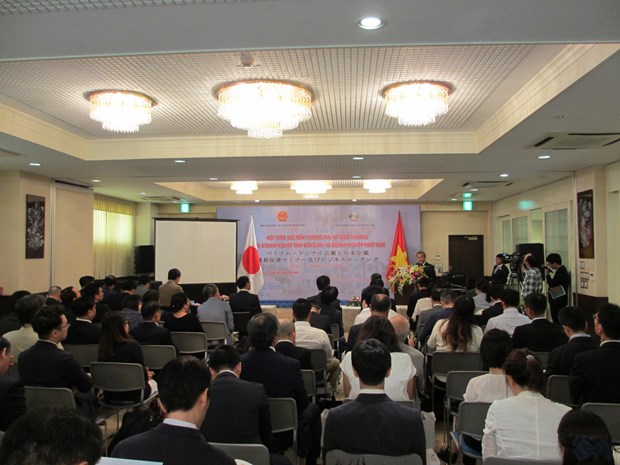
Dozens of Vietnamese and Japanese firms joined a conference promoting investment in and trade with Dong Nai province – a top destination for foreign investors in Vietnam – in Tokyo on September 19.
 |
| At the conference. |
Dozens of Vietnamese and Japanese firms joined a conference promoting investment in and trade with Dong Nai province – a top destination for foreign investors in Vietnam – in Tokyo on September 19.
In his remarks at the event, Vietnamese Ambassador to Japan Vu Hong Nam stressed Japan is among Vietnam’s most important and strategic overseas partners and investors, noting that Japanese-funded projects have contributed to boosting the country’s socio-economic growth.
The diplomat affirmed the Vietnamese Government and Dong Nai authorities are committed to creating the best conditions possible for Japanese investors.
He said he is confident that the southern province’s implementation of the Long Thanh international airport and investment attraction policy will help it lure more foreign investors, particularly those from Japan.
Tran Van Vinh, Vice Chairman of the Dong Nai People’s Committee, took the occasion to introduce the local growth potential and investment attraction policy.
According to him, having a young population, convenient transport system, and rich soil, Dong Nai is home to 1,420 valid foreign-invested projects worth nearly 30 billion USD. More than 40 countries and territories have so far invested in the province, with Japan ranking third in terms of project number and investment amount. The East Asian nation is currently running 259 projects worth 4.64 billion USD in the locality.
After the conference, Dong Nai’s enterprises and their Japanese peers began a series of meetings to seek cooperation opportunities.
In an interview with the Vietnam News Agency, Mai Van Nhon, deputy head of the management board of industrial parks in Dong Nai, said the province does not aim to attract foreign direct investment at all costs, but prioritises high-tech and environmentally friendly projects that do not follow labour-intensive practices.
Such policy has led to better quality of the foreign capital flow over years, he noted.
(Source: VNA)





